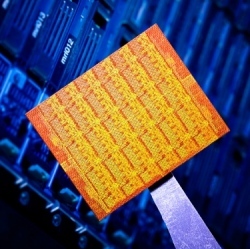
Four separate teams have taken a step toward achieving such "quantum speed-up" by demonstrating a simpler, more limited form of quantum computing that, if it can be improved, might soon give classical computers a run for their money. But don’t get your hopes up for a full-fledged quantum computer. The gizmos may not be good for much beyond one particular calculation.
The four groups have now demonstrated a more-limited type of quantum computation that might be developed more quickly. They all use photons, quantum particles of light, that run through a maze of crisscrossing optical channels. At the intersections, the photons can change paths with certain probabilities. In all of the experiments, three photons enter and exit through either five or six ports. The task is to calculate the probabilities for the photons to come out various combinations of output ports.
"The question is, does this give you a first step to doing a hard calculation quantum mechanically, and it looks like it might," says Scott Aaronson, a theoretical computer scientist at the Massachusetts Institute of Technology (MIT) in Cambridge and an author on one of the papers.
